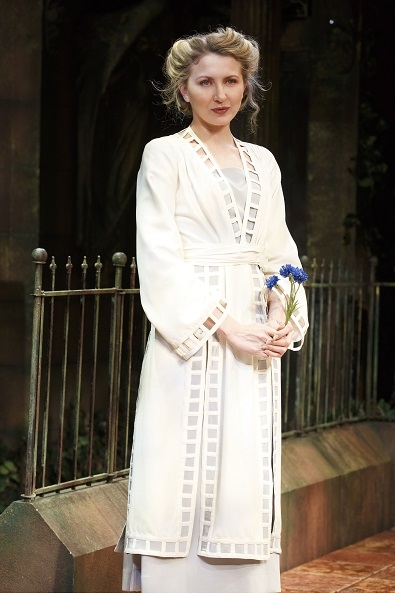Credits, or Credibility? (Part II)
This is part II of Michael Feingold's latest "Thinking About Theater" column.
Click here to read part I.

(© Joan Marcus)
The reliance on familiar names to market theatrical productions carries a double danger. First off, it hampers the theater's ability to explore both its future and its past: If everything has to be linked to a familiar name, neither the dead playwright who never made it onto a 10-best list nor the living actor who has not yet lucked into a TV series will get a break.
There are exceptions: Enthusiasm for Nina Arianda's off-Broadway appearance in David Ives' Venus in Fur led to her appearing on Broadway in both the revised version of that production and a revival of Garson Kanin's Born Yesterday. Now, back off-Broadway in Manhattan Theatre Club's Tales From Red Vienna, she finds herself referred to by reviewers as "the Broadway actress Nina Arianda," an appellation that she must find as funny as I do. These days, Broadway plays start almost anywhere but Broadway; there are actresses with a special gift for the stage, but there is no longer such a thing as a "Broadway actress," except in outdated stereotype.
But what's worst about the current obsession with credentialing is its effect on the public. Theater people, a contentious lot by nature, love taking exception. As soon as something becomes standard practice in the theater, an artist will instantly arise to demand that things be done differently; that's how an art evolves. The general public, however, prefers general agreement. It wants to like a show; it wants to go to a show that it believes it will like. If the discourse dinned into its innocent collective head celebrates only star names and hit titles, the public will inevitably start to believe that only these things matter, that they are all the theater is about. Indoctrinated to that belief, ordinary audience members, for whom theatergoing is a relative rarity, may not even notice when what they are watching becomes sterile and unenjoyable. They are partaking of what they have been told is theater, and ask no more.

(© Johan Persson)
I don't mean this as a complaint against media stars who want to make their presence felt on stage, or against the public that wants to see them in the flesh, after years of watching them move across two-dimensional screens. Let them come prove themselves, as artists like Denzel Washington and Daniel Radcliffe have proved themselves, and welcome. What is wrong is not that a star wants to try the stage, or (even better) that a star who began on the stage wants to come back to it. Something is wrong, instead, with the whole system that fetishizes stars and 10-best titles above all else, that instructs audiences, with endless reiteration, not to expect or perceive that anything else matters. Americans (and to some extent Europeans) are now so conditioned, and the theater seems eager to play into the hands of those doing the conditioning. From initial press announcement to post-opening e-blast, everything is geared toward celebrity. Even working artists who are no more than semi-celebrities, or who are not yet celebrities at all, are compelled to carry their meager portion of fame with them into every press release, in a little parenthetical phrase following their name, like an ID tag or security badge worn around their necks.
Because this incessant credentialing is constantly being updated — based on the newness and size of the credit, not on its actual value — it supplies a kind of steady slippage from artistic reality. An actor with four dozen Shakespearean roles to his credit, lately famous as somebody's grandfather on a sitcom, will not find his Polonius or his Shylock mentioned between those parentheses; an actress who would dearly love to forget that a hand-lotion commercial has been paying her rent will see the hand lotion, not the awards she earned for her Mother Courage in Omaha, cropping up after her name. The artists have been branded — a word that brings joy to marketing experts, but one that artists might well perceive in its older sense of "stigmatized." Like cattle, they now bear the mark that shows them to be some institution's property.

(© Brigitte Lacombe)
Ultimately, too, the credentialing spills over into criticism. Much space in reviews these days, it seems to me, is taken up with listing what the artists involved have previously done. Little, in contrast, is expended on discussion of what they do in the production under review — and even less on how they do it, whether it is worth doing, or what it means in the larger context of their work. There is no sense, after all, in comparing an actress' Amanda Wingfield to her Mother Courage, when what the reader most desires to know is that she's the one whose elegant fingernails are featured in that hand-lotion commercial.
Part of the cure for this state of affairs, I suppose, lies in education. The general public should and can learn to understand, that cultural literacy, like literacy itself, is worth having. The perspective it supplies can be both a useful guideline and a source of delight. Another part of the cure, though, lies simply in trust: The fear of market forces that makes producers rely on star names and familiar titles will not go away, but why shouldn't it be allied to a trust in the public's ability to know whom it considers a star, and in its willingness to follow a star who wants to do a risky play, instead of recycling one too often seen? The insistence on instant credentialing, on automatically feeding everyone the latest information in bite-size factoids, has begun to breed a generation unaware that our culture has an overarching shape, or an ongoing life. But when a generation automatically accepts whatever information it is fed, feeling no urge to inquire more deeply or to search more widely, good times do not lie ahead for art — or for any other aspect of life.
Michael Feingold's next two-part "Thinking About Theater" column will appear on consecutive Fridays May 16 and May 23.










